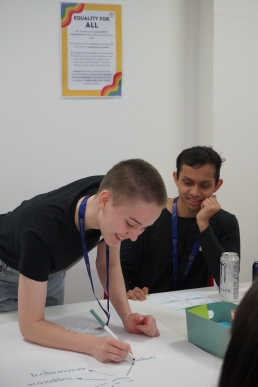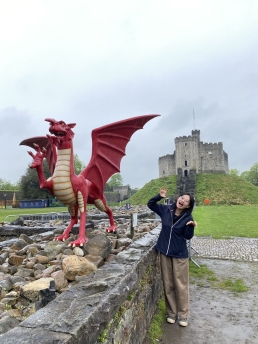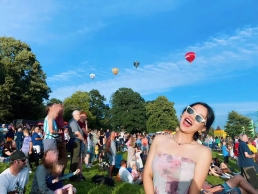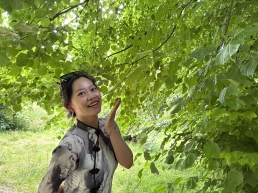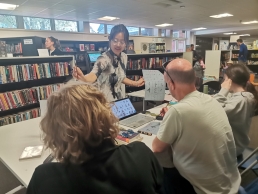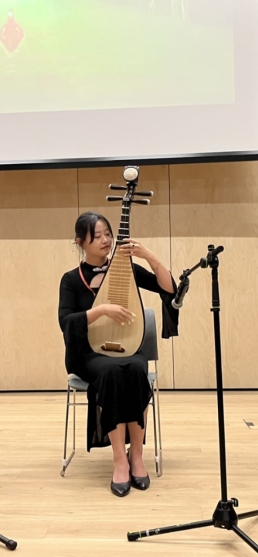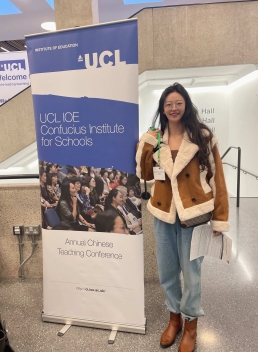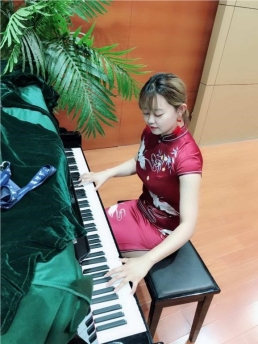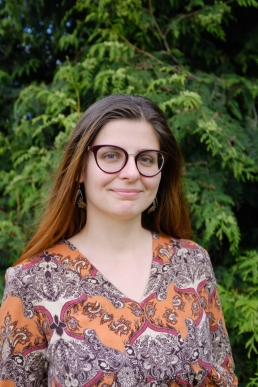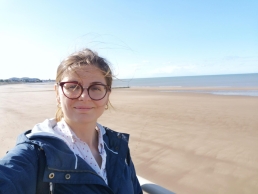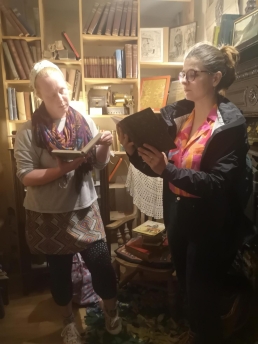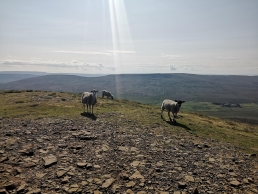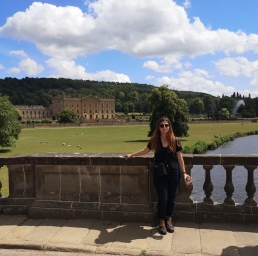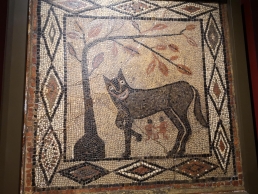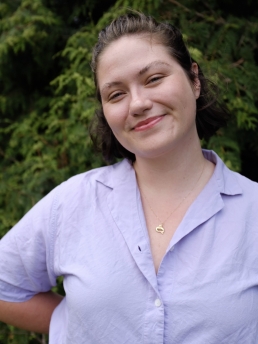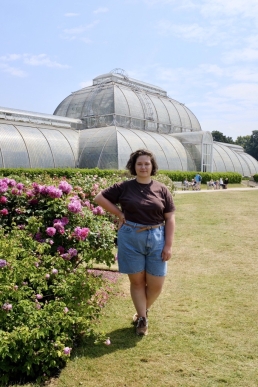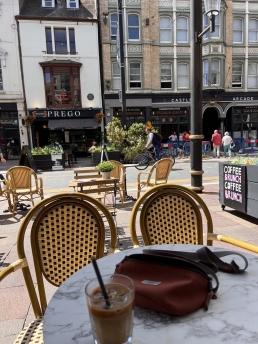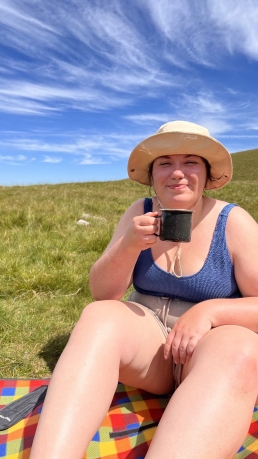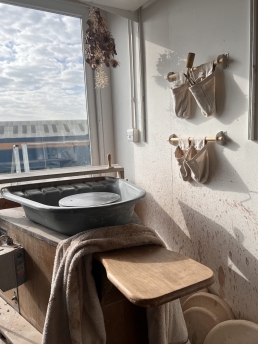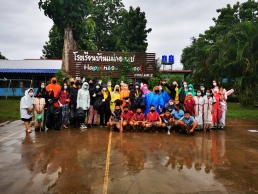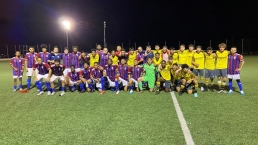Taith Pathway 2 Funding
Taith Pathway 2 Funding
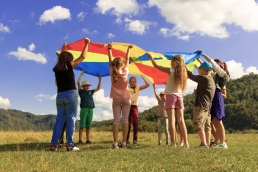
Taith is Wales’ international learning exchange programme, creating life-changing opportunities to learn, study and volunteer all over the world.
International mobilities link directly to the four purposes of Curriculum for Wales. Through working in partnerships all over the world, teachers develop new ideas and ways of teaching and discover new resources and tools to bring back to the classroom to enrich the learning of their learners.
International work is shown to have positive impacts on learners’ personal and learning outcomes and employability, particularly those from disadvantaged backgrounds. International mobilities enable learners to develop knowledge and skills and to experience new cultures and languages and they return with increased confidence, independence and motivation to learn.
We are pleased to share stories from some participants of the Taith programme across all sectors, who have visited countries all over the world on our website here.
Any school funded or maintained by a local authority and registered in, and operating from, Wales can apply for Taith funding which is available through two different pathways – Pathway 1 and Pathway 2. The call for Pathway 2 applications is now open until 30th November!
Pathway 2
Pathway 2 supports the sharing of knowledge, expertise and collaborative learning between Welsh and international organisations and will fund international collaborative partnerships to develop a project output which addresses a specific issue or sector priority in Wales.
Project applications should clearly identify the gap, issue or sector priority the project will address and explain how the planned project output will develop and expand knowledge, understanding and practices across the sector. Project outputs must be of high quality and value to schools and the sector more widely.
Outputs from Pathway 2 projects funded in the Schools sector in 2022 will include:
- Teaching toolkits and assessment plans to support teachers in minimising the recognised detrimental effects of transition from primary to secondary level education;
- Resources to support the development and sustainability of Community Focused schools in Wales;
- A toolkit to support schools to develop a bilingual education system and practical ways to make language accessible regardless of ability.
The application form can be found here on the Taith website. There are also resources to support applicants, including videos on completing the application form and the project budget and hints and tips from Taith’s external Independent Assessors.
If you have any questions or would like further information, please contact enquiries@taith.wales
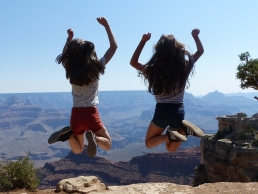
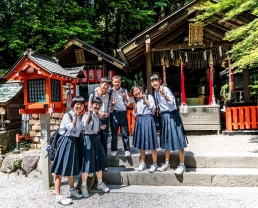
Language of the Month: Arabic
Exploring the Richness of Arabic Language and Culture
As an Arab from Libya, North Africa, I am excited to share my knowledge and insights about this rich heritage with you.
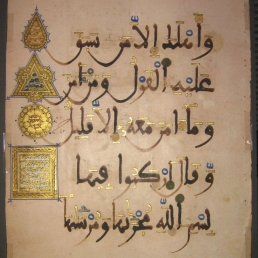
Cultural Traditions and Festivals:
Since it is mostly inspired by Islamic traditions, Ramadan and Eid festivals are the most popular and loved occasions as they bring communities together and offer a glimpse into the values and customs of the Arab world. Desserts, dances like the Dabke and music styles like the Oud are all part of the culture. Hospitality holds a special place in Arab culture. Guests are treated with respect and care. Sharing meals, sipping coffee with dates or tea with kaak, heartfelt conversations are central to Arab hospitality. This warmth and generosity create a strong sense of community and connection.
Arabic Cuisine, a fusion of flavours and influences:
Arab cuisine offers a full range of dishes that you might be familiar with like hummus, falafel, shawarma and desserts such as baklava and kunafa. Exploring the world of Arabic food not only introduces us to new and exciting flavours but also reveals the fascinating historical and cultural influences that have shaped Arab culinary traditions. Libya is a great example of a country whose cuisine has been influenced by many areas including Italy, the Mediterranean, the Middle East and Africa. Italian influences are particularly notable in Libyan cuisine, with dishes like pasta, risotto, and tomato-based sauces making their way into traditional recipes. The Mediterranean and Middle East inspire summer dishes like mezze. African influences contribute to the use of ingredients like dough-based dishes and couscous. It is a journey of culture exchange!
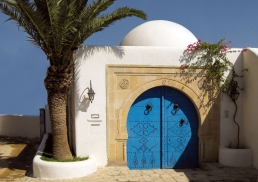
Arabic Language, More Than Words:
Arabic comes in different dialects and accents; the one taught to learners which is used in books and the news, is called Fus’ha or Modern standard Arabic. But the Arabic language is not only about words but also its script, which has intriguing aspects. For example, it doesn’t use capitalisation, instead, letters change shape when connected, creating an elegant calligraphic flow. Also, Arabic stands out with its right-to-left writing system, which may seem unusual to those accustomed to left-to-right languages.
Arab Culture and Traditions:
The Arab culture is incredibly diverse, with rich traditions that cross several regions. From Gulf countries to Mauritania, each region has its own distinct customs, cuisine, music, and art forms. In Wales, there are Arabs from many different areas who came here either to work, study or due to political conditions. Just in Swansea and Cardiff, I have met Libyans, Egyptians, Saudis, Syrians, Yemenis, Palestinians, Moroccans, Omanis and Iraqis. All have their dialects, traditions and special dishes!
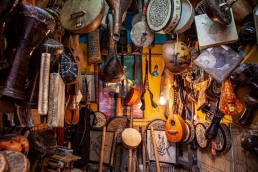
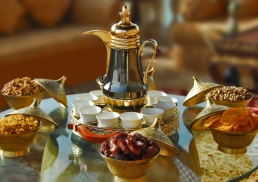
Arabic Art and Architecture:
The stunning geometric patterns you see in mosques and palaces, known as Islamic art, not only reveal the incredible talent of Arab artists but also their love of maths. Arab houses are typically spacious because of the hot weather, they are designed to keep the interiors cool and comfortable. When I visited Tunisia, I was fascinated by the unique architecture and the white walls with the windows and doors painted in beautiful sky blue.
Exploring the Arabic language and culture opens a world of wonder and beauty. From its unique script to its rich traditions and warm hospitality, Arabic offers a fascinating glimpse into the Arab world. I hope you enjoyed learning about this extraordinary language and culture. Shukran! (Thank you!)
2023 Training Weekends
2023 Training Weekends
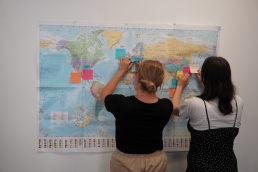
The MFL Mentoring team is still basking in the glory of the two fantastic mentor training weekends we had the pleasure of running in September. We welcomed around 200 students from across Wales to Cardiff University for our interactive and fun-filled training, and what a fantastic and truly inspiring bunch they are!
We covered different topics to equip the students with everything they need to be successful mentors. From mentor skills & qualities, safeguarding, understanding their role, and everything in between! Here’s what some of our lovely students had to say about the MFL Mentoring training weekend:
“The training was amazing, it helped me work on the areas I was struggling at and not only that it gave me confidence and an ability to see things differently, I didn’t expect this training to be that good but it was much better than I thought it would be”
“As a previous mentor, it never fails to surprise me how passionate and enthusiastic the MFL project team is. The training has definitely equipped me with the skills to become an effective mentor and helped me familiarise myself with the new Curriculum for Wales.”
We were also very excited to welcome Cardiff University’s new Vice Chancellor to the first ever Love Reading mentor training for an inspiring chat about our exciting pilot reading project aimed at encouraging reluctant primary school readers. The mentors particularly enjoyed the session exploring how to use their bodies, voices and space as tools to be the most effective and confident mentors. Please don’t take our word for it, have a look at some of the lovely feedback we’ve received about our Love Reading training:
“It was much more organised than I expected with how plentiful the resources are and the continued support throughout the days. Also how much the leaders believed in us was really refreshing to experience and quite inspiring.”
“It was so inclusive and friendly, I felt like I could really learn and ask questions in a safe and happy environment. I feel really confident that I can deliver my sessions but also ask for help as I go along. I really appreciate how welcoming it has been and how much effort went into it!”
We’re thrilled to have no fewer than 150 previous mentors joining us to mentor again this year across both projects. This is testament to the wonderful experiences that our students have in our partner schools as well as the sense of fulfilment and joy that mentoring brings them. Also, we’d like to take this opportunity to thank a number of our previous mentors for helping out during the training weekend and giving our new mentors the benefit of sharing their experiences of mentoring so far.
Our mentors truly are the beating heart of our project and it’s impossible to overstate the impact that near-peer mentors have on our young learners, the statistics speak for themselves; in 2022 41.8% of learners who participated in the mentoring sessions indicated they were ‘definitely’ or ‘probably’ going to take an IL for GCSE, compared with only 16% of learners who had answered the same question in the learner baseline survey. Now, that’s impact.
We cannot wait for this year’s cohort to get underway with their mentoring sessions and Linking Languages workshops. Here’s to the class of 2024 – we can’t wait to join you on your mentoring journey!
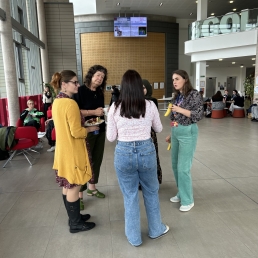
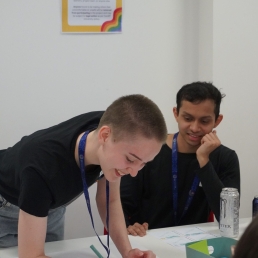
MFL Mentoring & The Confucius Institute: Meet Modi Zhu!
MFL Mentoring and The Confucius Institute: Meet Modi Zhu

Hi! My name is Modi Zhu, I’m a language tutor in the Confucius Institute at Cardiff University. I’ll be writing a series of blogs in collaboration with MFL Mentoring about my role within the Confucius Institute, as well as giving insight into Chinese tourist attractions, festivals, and people! But first, I thought I’d share a bit more about myself.
Hobbies
I am from a city in the Northeast of China called Daqing, which is known for its oil, natural beauty, and distinct seasons. I learnt to ski and skate there during the winters and developed a love for many other sports too, such as swimming, dancing, and tennis. Physical heath is very important in Chinese culture, and we try to keep active to stay healthy!
I have a real passion for music. My mother loved to play the piano, and I was lucky enough to learn from her, but I didn’t stop there! I went on to learn the pipa, guitar, drums, and during my time in Mongolia, I learnt the morin khuur. I love expressing myself through music – no matter what mood I’m in! I will be writing a whole blog about traditional Chinese music and classic songs, so stay tuned.
Languages and Me
Before I moved to Wales, I spent time in Mongolia and Guyana as a Chinese teacher. Mongolia has vast grasslands where cattle, sheep and horses graze and it is here that I learnt to ride a horse. Guyana is a tropical country in South America, where I spent two happy summers, and shared the campus with a local crocodile! Meeting students and sharing language and culture is so special to me, and I consider this a real gift.
When I first started learning new languages, my teacher encouraged me to speak aloud and not to be afraid of failure. They said “As long as you speak, half the battle is won,” and since then, I’ve learnt Japanese, Korean and Russian. To me, the best way to connect with different countries and cultures is by learning their language.
I am so excited to share more about my role in the Confucius Institute and Chinese culture through this blog series. Keep your eyes peeled for the next one! In the meantime, if you have any questions or would like to get in touch, please email me at ChooM@cardiff.ac.uk.
Meet Alex!
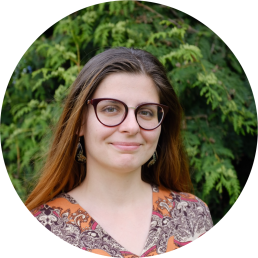
What is your role?
I am a Project Manager for a new pilot project called Love Reading Mentoring which aims to build a love of reading for young learners in primary schools. By creating engaging resources and activities delivered by student role models, we want to encourage pupils to see reading in everyday life and to discover the joy, empowerment and pleasure that reading can bring to a young mind. I work with education stakeholders, primary school teachers and student mentors to deliver this very exciting literacy project.
Tell us a bit about yourself
Unsurprisingly, I absolutely love reading and my love of stories has shaped the pathway I paved for myself so far. I grew up reading every book on the shelf and dreaming about all the places I could visit in the future.
I studied Sociology in Bucharest, my native city, I had a summer job in Greece, and then I decided I wanted to keep discovering new worlds through study, so I did a Masters in Cultural Studies at the University of Freiburg, Germany. After I finished my studies, I moved to Cardiff because I had never been to Wales before. I wanted to experience the world of Dylan Thomas and Roald Dahl and I enjoyed it so much that I have been here for over 7 years!
In my professional life I sought roles that gave me opportunities to learn and help people in creative ways. I worked in the charity sector, in education, in widening participation and community outreach. I get the most joy out of creating opportunities and experiences for young people, which inspire them to dream, read and explore.
What do you enjoy most about the project?
I strongly believe that the Love Reading Mentoring project is not just needed, it is essential. Young learners need to be given access to a variety of tools and role models that inspire them and show them new experiences of the world. It is challenging to achieve so much with only 6 sessions of mentoring and my favourite thing about the project is that every single professional, teacher, student, and colleague I have worked with so far has been 100% committed to supporting the project, sharing expertise, and making time and space for young people to get this opportunity.
I am humbled by the dedication and passion of teachers, who go above and beyond to create unique, exciting learning environments for each and every one of their pupils. Most of all, I am grateful for my amazing MFL Mentoring team – I am lucky to work with fantastic, kind, creative individuals who make even the most challenging day exciting and fun!
Afrikaans: As rich and diverse as the South African landscape

Afrikaans: As rich and diverse as the South African landscape
The Afrikaans culture is as rich and diverse as the South African landscape. It originated at the most southern point in Africa with the arrival of settlers from the Netherlands in 1652.
The pure Dutch language could not hold up against the strong influences of the local languages and those of the slaves who were imported to Cape Town. The result is a rich, manifold language and culture, with aspects borrowed, inherited and created from the Khoisan, and the slaves from places like the Far East, Portugal, Indonesia, Madagascar, Mozambique and Angola.
One of the most important happenings in the Afrikaans history is the Great Trek, the migration of early Afrikaans settlers who travelled by wagon from the Cape Colony to far flung corners of South Africa from 1836 onwards. This was an enormous feat of endurance with large communities trekking across harsh landscapes to create new settlements. Visit the Voortrekker Monument in Pretoria too see a permanent exhibition dedicated to the Groot Trek and Afrikaner culture and history.
The language became a political instrument and in June 1976, it led to one of the turning points in the struggle against apartheid. Visit the Apartheid Museum in Johannesburg, where there is a permanent exhibition dedicated to this event. It is an emotional experience, illustrating how things that can bind people together, like language, can also be used to divide communities.
Today, the Afrikaans community is striving towards inclusivity, not only embracing the different origins of this indigenous language but proudly playing its role in the broader South African community.
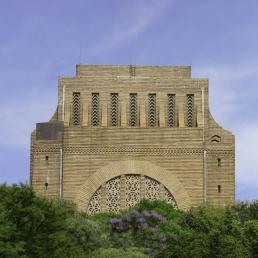
Recipe
Afrikaners pride themselves in their excellent baking skills, and you probably won’t get anything more Afrikaans than a koeksister. Directly translated, koeksister means “knotted sister”, which is a pretty accurate description. It is a delicious, deep fried, syrupy delight and always does the trick if you are after a sweet treat to go with your tea (or whenever you fancy it!).
SYRUP
250ml water (1 cup)
625ml white sugar (2 1/2 cups)
12 1⁄2ml lemon juice (2 1/2 tsp.)
5ml vanilla essence (1 tsp.)
DOUGH
375ml cake flour (1 1/2 cups)
22ml baking powder (4 1/2 tsp.)
1ml salt (1/4 tsp.)
150ml milk (the vanilla soy milk gives added flavor, 5/8 cup) or 150 ml vanilla-flavored soymilk (the vanilla soy milk gives added flavor, 5/8 cup)
750ml canola oil (3 cups)


DIRECTIONS
Put the water and sugar in a pot and bring to boil on low heat. Stir frequently until the sugar is completely dissolved. Boil for 7 minutes.
Remove the pot from the stove and stir in the lemon juice and vanilla essence. Put the pot into the fridge.
Mix the flour, salt, and baking powder thoroughly in a mixing bowl. Break the butter or margarine into small pieces and add to the four mixture. Add the milk. Mix well until a dough is formed.
Roll the dough out to a thickness of 5 mm (+ or – 1/4 in.). Cut the dough into thin (+ or – 10 mm or 1/2 in.) strips. Take 3 strips and join their ends on one side. Braid the strips to desired koeksister length and join other ends.
Heat the oil in a pot until fairly hot. Put about 3 koeksisters (or what can fit)at a time in the oil and fry them on both sides until they get a golden-brown color. As you remove the koeksisters for the oil, place them directly ito the syrup from the fridge. It is important to keep the syrup cool, so between soakings, return the syrup to the fridge to maintain its coolness.
Remove the koeksisters from the syrup and allow the excess syrup to drip off. Place them in the refrigerator to cool and then eat!
Meet the Mentor - Samantha!
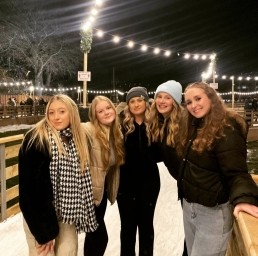
Meet the Mentor - Samantha!
About Me
Hi/Bonjour/Ciao/Shwmae! My name is Samantha, I’m 19 years old and I’m currently a first-year student studying French and English Literature at Cardiff University.
Originally, I’m from a seaside town in North Somerset called Weston-super-Mare, where I can see Cardiff from across the waters. It’s quite comforting whenever I feel homesick, and I always feel relaxed next to the sea.
My degree allows me to combine two things I love: I can learn a language I’m passionate about and explore interesting texts I’ve never read before (I’m a big fan of medieval literature!).
Thanks to the ‘Languages for All’ courses that my university offers I’m also studying Beginners Italian. Although it’s difficult, I’m really enjoying learning a language I’ve never had the opportunity to learn before and it’s so interesting learning about a culture I haven’t had much experience with (apart from the food!).
A fun fact about me is that I’m dog MAD. I have a 12-year-old dog at home and another that my family rescued last year so we’re not quite sure of her age. I’d say the hardest part about going away to university was leaving them behind.
My Take on School
I went to secondary school in my local area, where I was first properly introduced to learning languages. I only started learning French when I started secondary school and, in all honesty, I didn’t have much interest in it until I started studying it at GCSE, when my French teacher helped me fall in love with the language. My teacher really encouraged me and supported me both inside and outside of school and this led to me trying harder in class and learning more about the language outside of lessons. It was this same teacher who encouraged me to apply to go to university after I left secondary school.
I was always quiet in school, but languages really helped me gain confidence speaking which has helped me in all areas of my life. Even at university, languages have given me the courage to do things I never would have expected of myself, like *audition for dance classes and even deliver a presentation in my French class, which was a big *accomplishment for me personally.
Languages and Me:
The languages I currently speak are English, French, and Italian but I would always love to learn more if I have the time and opportunity. If I could speak any other language, I would love to speak Welsh as my mum and her family are originally from Neath. Unfortunately, my mum didn’t *retain the language when she moved to England and, as I had no Welsh-speaking relatives to learn from, the language died out in my family which is sad. I would love to have the opportunity to learn more Welsh and reconnect with my roots, it’s a language unlike any I’ve studied before.
My first *encounter with languages was probably through dance. I’ve been dancing ballet since I was two and learning the language that the artform originated from (French) has really helped me as I’ve progressed.
Even now, as part of Cardiff’s advanced ballet team, French helps me with every lesson – it feels like a cheat sheet if I don’t remember the actual move (which happens quite a lot!).
Through learning French, I’ve also been able to join the modern languages netball team at university, which has been really good for keeping active and the other girls have been so supportive and positive.
I was so excited to go to university and have the chance to study Italian alongside my degree. Although I’ve never been to Italy, I love the food and thought the language sounded so cool, so I signed up straight away for the Languages for All beginners’ class. I’m now on part 3 and still loving it!
My Student Life:
I was really nervous about going to university. I’d never moved before, and I was the first person in my family to study A-levels let alone a bachelor’s degree. So, I really didn’t know what to expect.
However, since coming to university I can honestly say I’ve had some of the best times of my life. The independence of moving out has been great and I’ve made friends from all over the world, not just the UK.
I love my degree, even though initially I was worried about whether I would enjoy it. Even *modules that I was unsure about taking have ended up being really enjoyable, though I have to say that my absolute favourite module so far has been Medieval Literature.
The social side of university has also been amazing! The fancy dress club socials have been so much fun – so far, I’ve dressed as a pineapple and a member of Abba as well as competed for the ugliest shirt on a night out!
My original reasons for taking French and English were that I genuinely enjoyed the subjects, even if I found them challenging, I realised that I was still drawn to languages and literature regardless. However, as I started applying for a university place, I was really drawn to the idea of spending time outside the UK on a year abroad. I’m so excited that I get to do that as part of my degree, and there are so many different options to choose from in terms of what I can do during my time away.
I hope that one day I can travel and work internationally with my language skills. That is my ultimate goal!
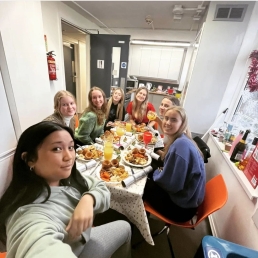
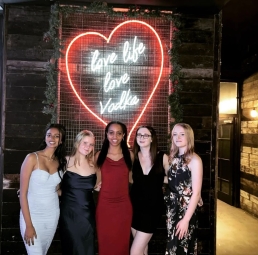
*accomplishment – something that you are proud of
*audition – where you perform something practical (a dance, song etc) to get a role, job or place in a group
*retain – keep hold of
*encounter – meeting
*modules – these are classes that you choose at university
About Me
Hi/Bonjour/Ciao/Shwmae! My name is Samantha, I’m 19 years old and I’m currently a first-year student studying French and English Literature at Cardiff University.
Originally, I’m from a seaside town in North Somerset called Weston-super-Mare, where I can see Cardiff from across the waters. It’s quite comforting whenever I feel homesick, and I always feel relaxed next to the sea.
My degree allows me to combine two things I love: I can learn a language I’m passionate about and explore interesting texts I’ve never read before (I’m a big fan of medieval literature!).
Thanks to the ‘Languages for All’ courses that my university offers I’m also studying Beginners Italian. Although it’s difficult, I’m really enjoying learning a language I’ve never had the opportunity to learn before and it’s so interesting learning about a culture I haven’t had much experience with (apart from the food!).
A fun fact about me is that I’m dog MAD. I have a 12-year-old dog at home and another that my family rescued last year so we’re not quite sure of her age. I’d say the hardest part about going away to university was leaving them behind.
My Take on School
I went to secondary school in my local area, where I was first properly introduced to learning languages. I only started learning French when I started secondary school and, in all honesty, I didn’t have much interest in it until I started studying it at GCSE, when my French teacher helped me fall in love with the language. My teacher really encouraged me and supported me both inside and outside of school and this led to me trying harder in class and learning more about the language outside of lessons. It was this same teacher who encouraged me to apply to go to university after I left secondary school.
I was always quiet in school, but languages really helped me gain confidence speaking which has helped me in all areas of my life. Even at university, languages have given me the courage to do things I never would have expected of myself, like *audition for dance classes and even deliver a presentation in my French class, which was a big *accomplishment for me personally.
Languages and Me:
The languages I currently speak are English, French, and Italian but I would always love to learn more if I have the time and opportunity. If I could speak any other language, I would love to speak Welsh as my mum and her family are originally from Neath. Unfortunately, my mum didn’t *retain the language when she moved to England and, as I had no Welsh-speaking relatives to learn from, the language died out in my family which is sad. I would love to have the opportunity to learn more Welsh and reconnect with my roots, it’s a language unlike any I’ve studied before.
My first *encounter with languages was probably through dance. I’ve been dancing ballet since I was two and learning the language that the artform originated from (French) has really helped me as I’ve progressed.
Even now, as part of Cardiff’s advanced ballet team, French helps me with every lesson – it feels like a cheat sheet if I don’t remember the actual move (which happens quite a lot!).
Through learning French, I’ve also been able to join the modern languages netball team at university, which has been really good for keeping active and the other girls have been so supportive and positive.
I was so excited to go to university and have the chance to study Italian alongside my degree. Although I’ve never been to Italy, I love the food and thought the language sounded so cool, so I signed up straight away for the Languages for All beginners’ class. I’m now on part 3 and still loving it!
My Student Life:
I was really nervous about going to university. I’d never moved before, and I was the first person in my family to study A-levels let alone a bachelor’s degree. So, I really didn’t know what to expect.
However, since coming to university I can honestly say I’ve had some of the best times of my life. The independence of moving out has been great and I’ve made friends from all over the world, not just the UK.
I love my degree, even though initially I was worried about whether I would enjoy it. Even *modules that I was unsure about taking have ended up being really enjoyable, though I have to say that my absolute favourite module so far has been Medieval Literature.
The social side of university has also been amazing! The fancy dress club socials have been so much fun – so far, I’ve dressed as a pineapple and a member of Abba as well as competed for the ugliest shirt on a night out!
My original reasons for taking French and English were that I genuinely enjoyed the subjects, even if I found them challenging, I realised that I was still drawn to languages and literature regardless. However, as I started applying for a university place, I was really drawn to the idea of spending time outside the UK on a year abroad. I’m so excited that I get to do that as part of my degree, and there are so many different options to choose from in terms of what I can do during my time away.
I hope that one day I can travel and work internationally with my language skills. That is my ultimate goal!


*accomplishment – something that you are proud of
*audition – where you perform something practical (a dance, song etc) to get a role, job or place in a group
*retain – keep hold of
*encounter – meeting
*modules – these are classes that you choose at university
Meet Laura!
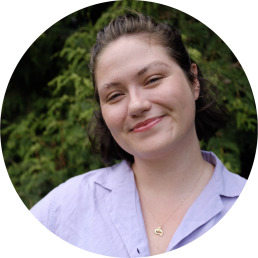
What is your role?
I am MFL Mentoring’s Social Media and Digital Content Officer. I design, create and share everything that you see on all our social media platforms, and also help the team out with their graphic design needs! I joined MFL Mentoring in May 2023 after running my own online ceramics business for three years.
Tell us a bit about yourself
I was born and raised on a farm in the North East of South Africa, in a province called Mpumalanga (it means the place were the sun rises” in Swazi, Xhosa, Ndebele and Zulu languages). My mum is Afrikaans speaking South African and my dad French speaking Belgian and we all communicated in English! South Africa has eleven official languages (!!) so I have always been conscious of how important it is to be able to communicate with people who speak a different language to you.
I eventually went to university to study Visual Communication, as I wanted to combine my love for language and communication with my passion for design and creativity. After finishing my studies in South Africa, I moved to Liverpool, where I worked for National Museums Liverpool alongside freelancing as a Scientific Graphic Designer. During lockdown I started my online ceramics business, where I used social media as my main tool for selling and promoting my business. Toward the end of 2021 I moved to Cardiff and I am lucky enough to have found and joined the wonderful team at MFL mentoring!
Outside of work I love to go camping in the Spring/Summer (I am still very much NOT keen on Northern Hemisphere winters), gardening and finding cool brunch spots to go to with my partner and friends. If you want to bribe me you can buy me a cheese platter.
What do you enjoy most about the project?
The thing that I love most about the project is its approach to language learning. It takes the pressure off of being perfectly fluent and focuses on the benefits of being able to communicate in different languages, no matter what level you are at. It really makes language learning feel so much more accessible.
International Activities in Further Education
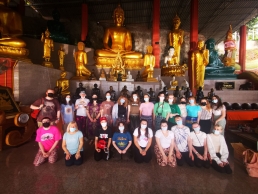
Here’s an insight into the exciting international visits currently taking place by learners and staff in the Further Education sector in Wales – the first blog of many we hope!
First of all though – what is Further Education or FE?
FE colleges work with a diverse group of learners from 16 year old school leavers to adult learners in their 90s! There’s loads on offer at an FE college – here are some examples:
- Learn a skill or trade
- Study a vocational subject like Hair & Beauty, Engineering, Animal Care
- Take A levels in a wide range of subjects
- Study as part of an apprenticeship programme
- Take adult learning courses in basic English, maths and other entry level courses
On top of all of this, FE learners can spend some time overseas as part of their course. They can attend training programmes, volunteer or do work placements anywhere in the world from 5 days to a whole year! A bit scary?! Well, for visits up to two weeks, the learners will also be accompanied on the visit by staff from the college.
And, the best bit? The majority of these visits are funded by recognised government programmes like Taith (Welsh Government) and The Turing Scheme (UK Government) ColegauCymru leads on pan Wales consortium applications for funding from both programmes on behalf of the sector. Colleges can also apply for their own funding.
Some of the learner visits that have been organised in the last 12 months through ColegauCymru’s consortium projects include:
Coleg Gwent Photography A level to Tenerife
Coleg Ceredigion Health & Social Care to Canada
Coleg Sir Gâr A level to Thailand
Cardiff and Vale College Football Academy (male and female) to Benfica, Portugal
There’s no need to be a fluent speaker of Spanish, Portuguese or any other language to take part in these visits. However, as part of the selection process, learners need to demonstrate their commitment to learning some of the language and exploring the culture and traditions of the countries they’re visiting before they leave. These are excellent opportunities for broadening horizons, building confidence and raising aspirations. So many times in evaluations we’ve heard ‘these were the best two weeks of my life!’
And for FE staff, there are some innovative visits taking place right now to Japan, Dubai, Spain, Thailand, Mexico and the US – global CPD opportunities that will lead to the enrichment and enhancement of the learning experience for FE learners.
Have a quick look at this video showing what was achieved working with Nexgen Careers, WJEC and colleges across Wales to internationalise our delivery of the new Advanced Skills Baccalaureate Wales qualification.
This is Blog 1 from the FE sector – there’ll be more where you can hear from learners, staff and our international partners about these exciting visits!
Cerdd Iaith and ‘Tango’r Tengo’ – Cerdd Iaith is for everyone!
Cerdd Iaith and ‘Tango’r Tengo’ – Cerdd Iaith is for everyone!
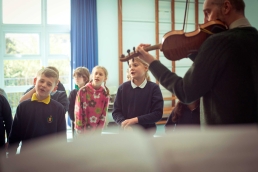
Take a look at blogs 1 and 2 to get an introduction to the British Council’s Cerdd Iaith resources. In this blog, we’re exploring some more aspects of this resource.
So, let’s take a look at the song ‘Tango’r Tengo’ which is an integral part of the Cerdd Iaith resource. The aim of this song is to introduce learners to the idea that some phrases don’t translate exactly. To help them understand this we encourage the learner to listen deeply and to try different melodies and languages simultaneously. The Tango is traditionally a very emotional dance, so again it’s important for learners to engage their whole bodies and to see what expressive dance moves they can come up with!
Another important aspect of Cerdd Iaith, and in many ways the most important, is that the teacher gets to try new things, to break with the normal routines of a lesson and get funky! This means that things will go wrong, it’s inevitable, perhaps especially if the teacher isn’t a linguist, but this doesn’t matter because mistakes are the best way to learn! Creative language learning is as much about embedding an ethos, that it’s ok to make mistakes, into language lessons, as anything else.
We know that many countries around the world use nursery rhymes to entertain and to teach learners about the world and as Professor Susan Holland explains in her book The Power of Music:
There is now a substantial body of evidence to suggest that engagement with music plays a major role in developing oral perceptual processing patterns while facilitating coding and identification of speech sounds and patterns.
Integrating drama games and song into the learning process for international languages is not new. What goes one step further is the concentration on encouraging teachers to use the sound qualities of the languages themselves, the essential muscularity and musicality of the language to help learners to find where the language sits in their minds, imaginations, and bodies.
As Dr Jessica Mordsley, who evaluated the initial pilot of Cerdd Iaith, points out in her blog, ‘Why use rhythm and rhyme and repetition in a Language Learning class?’:
Musicians convey language patterns more easily than non-musicians, and there are parallels between the skills the musicians and linguists need – for example, the ability to identify and create specific sounds, to segment sound patterns, (i.e. divide them into smaller unit of sound) and the need to develop sophisticated aural memory and perception.
Dr Mordsley goes on to say:
Every spoken language has its own ‘prosody’ – the characteristic patterns of stress, intonation, and rhythm. Unlike English, in both Welsh and Spanish, the stress usually falls on the penultimate syllable of a word (although this varies according to the position of the word in the phrase). Some primary schools have been teaching English, Welsh, and Spanish at the same time… (using the Cerdd Iaith resources) this helps to train the learners’ ears to hear the characteristic rhythms and melodies of the three languages.
For example, in Cerdd Iaith, the first exercise simply introduces single words in English, Spanish, Welsh, and German. Each syllable of each word has a musical tone and rhythm, it is already a small unit of music. When you add to this a series of images that the word represents, you are appealing to the child’s imagination, using that word and what it can represent. When you ask the child to create that word or picture with their bodies, the learning becomes physical and embodied.
It cannot be stated strongly enough that Cerdd Iaith was created to support non-specialist language teachers, it requires teachers to only be one step ahead of their learners, or even to be co-creating language learning as they progress through the exercises. However, to be clear, we are not advocating that there is a magic pill for learning a language. Malcolm Gladwell’s 10,000 hours theory holds as true to languages as most other things and achieving proficiency in a new language requires months and years of hard work. However, Cerdd Iaith is aimed at Primary School teachers and is first and foremost a tool to encourage the fun and creativity in language learning in the hope that learners will carry this enjoyment forward, progressing to secondary school with the idea that languages can be fun and creative.
So, why not give it a go with your learners, and see where Cerdd Iaith takes you?
Note: The British Council developed the Cerdd Iaith resource with colleagues from BBC National Orchestra of Wales, Yr Athrofa – the Institute of Education (UWTSD) and Ein Rhanbarth ar Waith (ERW), with the help of the Paul Hamlyn Foundation’s Teacher Development Fund. We hope you enjoy using it and would love to hear what you think. If you have any questions please get in touch at TeamWales@britishcouncil.org and please visit the Cerdd Iaith website here.

